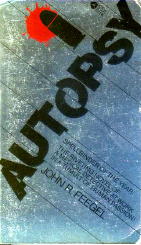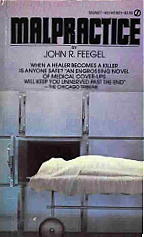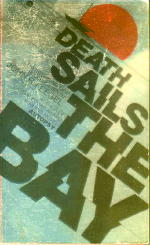Sun 22 Jul 2007
Review: JOHN R. FEEGEL – Autopsy.
Posted by Steve under Authors , Awards , Crime Fiction IV1 Comment
JOHN R. FEEGEL – Autopsy.
Avon 22574. Paperback original, 1975.

When a Florida tomato salesman apparently commits suicide in a second-rate Connecticut motel, the insurance company naturally refuses to payoff, and off to court they go.
A lot of book is summarized in that one line. Feegel is both a lawyer and a practicing forensic pathologist, quoting from inside the back cover, and he lovingly fills in all the clinical details of embalming, funeral procedures, exhumations and so on that any of us would ever want to know. His courtroom expertise is equally evident, but may I say that the insurance company’s defense attorneys do a hopelessly inadequate job, and that’s a tremendously difficult premise to swallow.
The detective story aspect rings completely false as well, which is surprising, since this book won an MWA Edgar as the best paperback mystery of the year. Again if I may, I’d say that Feegel is guilty of [literary malpractice] in his portrayal of the killer’s [deliberately misleading] post-mortem behavior, and the way he handles the questioning of the girl in the next room is most singularly strange. In fact, while Feegel, a Floridian, obviously doesn’t think much at all of coroners and policemen up here in good old Connecticut, that’s hardly a reason to make every one of his characters from this state a completely stereotyped caricature. How can a book so eminently readable also be so woefully inadequate? (B minus)
[UPDATE] 07-22-07. It’s far too late, I know, but I’ll issue the author an apology anyway for misspelling his name as “Fleegel” throughout this review, and it’s been corrected. I also said earlier that I wouldn’t change anything in these old reviews, but in this case I overruled myself and made an exception, as you’ll see above.
The following was taken from an online obituary for the author:
“The son of a police officer, Feegel grew up to become a forensic pathologist, a trial attorney and the chief medical examiner in Tampa. He performed thousands of autopsies; the death of Elvis Presley and Atlanta serial killer Wayne B. Williams were two of his most famous cases.
“Feegel also wrote seven mystery novels. In 1976, he won the Edgar Award from the Mystery Writers of America for his first book, Autopsy.”

From Crime Fiction IV, by Allen J. Hubin, here’s a complete list of his fictional work that qualifies as crime-related, slightly expanded:
o Autopsy (n.) Avon, pbo, 1975.
o Death Sails the Bay (n.) Avon, pbo, 1978.
o The Dance Card (n.) Dial Press, hardcover, 1981. Avon, pb, 1982.
o Malpractice (n.) New American Library, hardcover, 1981. Signet, pb, 1982.
o Not a Stranger (n.) New American Library, hardcover, 1983. Signet, pb, 1984.
[Later.] I’ve just noticed that the obituary said that John Feegel wrote seven mysteries, but Al Hubin lists only five. Hmm. That’s something that should be looked into.
[Still later.] Aha. I’ve found both of the missing titles:
o Eco-Park: The Al-Hikma Legacy (n.) Authors Choice Press, softcover, March 2001.
o Death Among the Ruins (n.) Writers Club Press, softcover, September 2002.
 [UPDATE] 07-23-07. In my original post I included a comment that cover images for Feegel’s books were difficult to come by. The only one I could find yesterday was the one for Malpractice.
[UPDATE] 07-23-07. In my original post I included a comment that cover images for Feegel’s books were difficult to come by. The only one I could find yesterday was the one for Malpractice.
In this morning’s email Bill Crider, whose supply of old mystery paperbacks is nearly endless, sent me two additional ones, both of which you now see here. Unfortunately the silver reflective covers don’t scan well, so the results are not up to either Bill’s or my standards, but I think they will do.
I also asked Bill if he’d ever read one or both. His reply: “I read the first one because it won the Edgar. I remember nothing at all about it except that I was impressed by the forensic details. I thought of the book back when Patsy Cornwell was becoming famous and wondered if it was one of the first to introduce that kind of stuff.”
Not being a fan of forensic details myself, it hadn’t occurred to me before, but I really think that Bill is onto something here.
February 2nd, 2013 at 10:03 pm
I used to work for Dr. Feegel in the mid 80’s. I was a receptionist at the Law Firm of Mitzel, Mitzel and Feegel PA in Tampa, FL. I thought highly of him. He was quite the character. I do have 2 signed books, Death Sails the Bay and Autopsy. Sad to see he passed away. Can still smell the smoke of his Cuban Cigars!